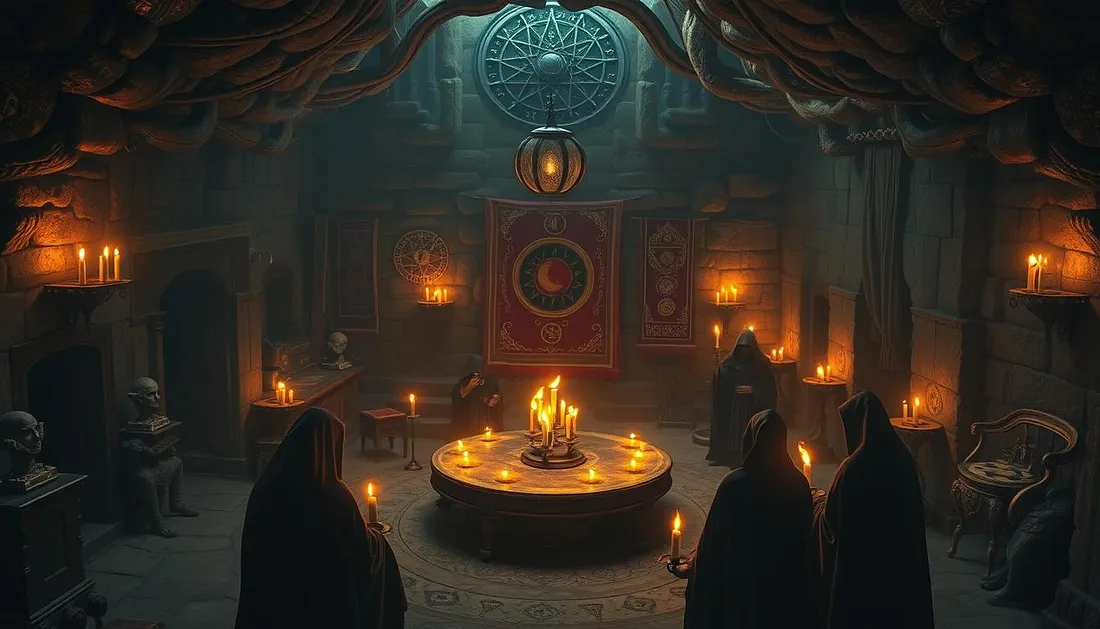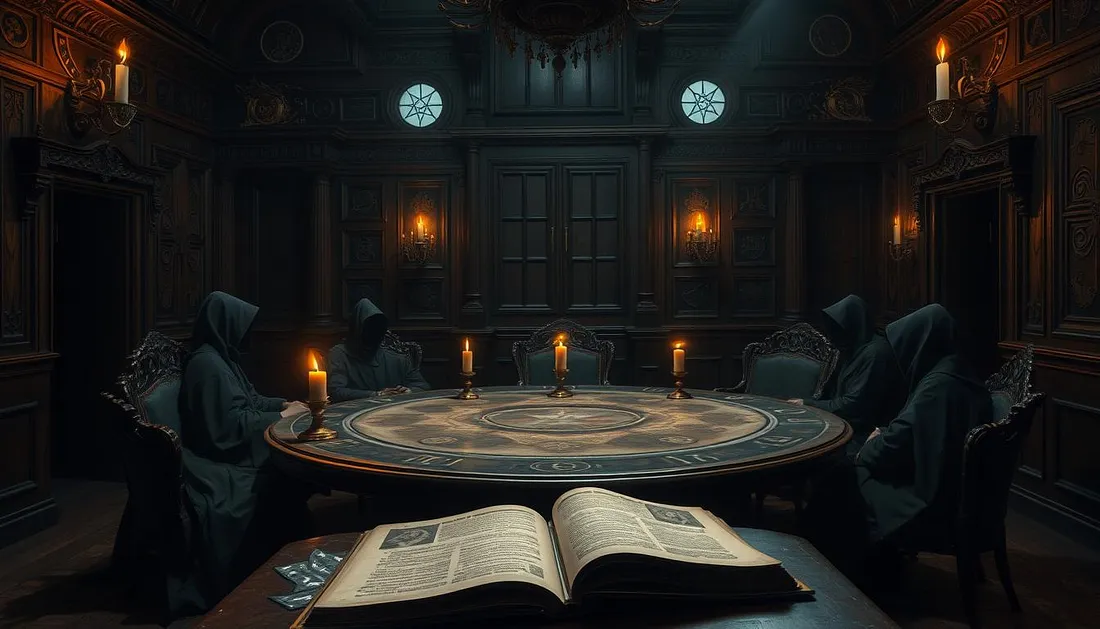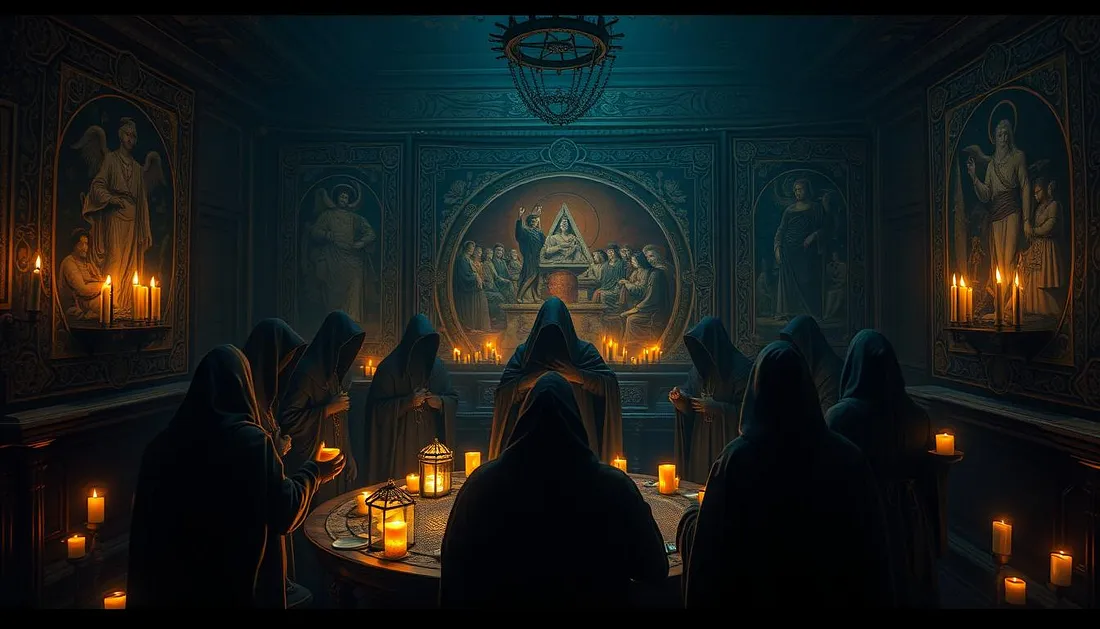The secret society
Secret societies have always sparked our curiosity. They are mysterious groups with hidden rituals and secret meetings. These groups are full of intrigue, from ancient legends to today’s whispers of power.
But what are secret societies, and why do they intrigue us so much? Exploring their history, we find a world of secrets and symbols. These groups stick to their values, even through time
Key Takeaways
- Secret societies are covert organizations with hidden rituals and exclusive gatherings.
- They have a long and intriguing history, with roots that stretch back to ancient times.
- These societies are driven by core values and beliefs that shape their actions and influence.
- The allure of exclusivity and the promise of power have made secret societies a persistent phenomenon.
- Understanding the nature and impact of secret societies is crucial in navigating the complexities of the modern world.
What is the Secret Society?
A secret society is a group that keeps its activities and members hidden. These groups have been around for a long time. They fascinate people with their secret society definition, mysterious ways, and rumored power. To understand these groups, we need to know their history of secret societies and values and beliefs.
Origins and Historical Background
Secret societies started in ancient times. Back then, groups formed to keep special knowledge safe. The Pythagorean Brotherhood in ancient Greece and the Eleusinian Mysteries in ancient Rome were examples.
Today, we have groups like the Freemasons, the Illuminati, and the Skull and Bones Society. Each has its own history of secret societies and level of secrecy.
Core Values and Beliefs
- Exclusivity and Selectivity: Secret societies are proud of being exclusive. They have strict rules to keep their group small.
- Esoteric Knowledge: These groups aim to learn, keep, and share special knowledge. This can be about spirituality, politics, or social issues.
- Symbolism and Ritual: They use symbols and rituals to create a sense of belonging. These help to strengthen their values and beliefs.
- Mutual Support and Advancement: Secret societies offer a network of connections. This helps members grow personally and professionally.
By learning about the secret society definition, history of secret societies, and values and beliefs, we can see why they are so intriguing. They have captivated people for centuries.
The Allure of Exclusivity
In the world of secret societies, exclusivity is a major draw. People from all walks of life join these groups. They seek a special membership that makes them stand out.
The exclusivity in secret societies attracts those who want privilege. It promises unique knowledge and influential connections. Being part of a closed society seems to offer advantages.
Many join for the sense of significance and recognition. These groups let people show their status and make important connections. They can even shape the world around them.
“The secrecy and exclusivity of secret societies are both their greatest draw and their most intriguing mystery.” — Anonymous
But, chasing exclusivity comes with risks. The quest for power can lead to unethical actions. Members might do wrong to keep their group’s secrets and prestige.
https://youtube.com/watch?v=opBy-sQ75Vw
The allure of exclusivity in secret societies is complex and fascinating. It continues to captivate people worldwide.
Initiation Rituals and Ceremonies
Secret societies are full of mystery, especially their initiation rituals and ceremonies. These rites mark the start of membership. They let people dive deep into the secret society initiation rituals and discover the hidden meanings in secret societies.
Symbolism and Hidden Meanings
The symbolism in secret societies is key in these ceremonies. Symbols like robes, hand gestures, and passwords mean a lot. They show the group’s values and traditions.
These symbols guide new members into a world of mysticism and ancient knowledge.
- Intricate rituals involving candles, incense, and sacred objects
- Blindfolding and other sensory deprivation techniques
- Dramatic reenactments of mythological or historical events
- Sworn oaths of loyalty and secrecy
The hidden meanings in secret societies are often tied to deep symbolism. Initiates must explore these meanings. This journey helps them understand the group’s true nature and their place in it.
“The true purpose of a secret society’s initiation rituals is not merely to test the resolve of its members, but to instill a sense of profound connection to the organization’s history, values, and symbolism in secret societies.”
Prominent Members Through the Ages
Secret societies have been filled with influential famous secret society members throughout history. These historical figures in secret societies have made significant impacts. Let’s look at some of the most influential people in secret societies and their contributions.
Benjamin Franklin, a founding father of the United States, was a Freemason. His involvement in the Freemasons likely influenced his work. He helped start the first public library and fire department in America.
Sir Isaac Newton, a famous scientist and mathematician, was in the Royal Society. This group brought together top thinkers of his time. Newton’s work in physics and astronomy has greatly influenced science.
Member Secret Society Contribution Benjamin Franklin Freemasons Founding father of the United States, established the first public library and fire department Sir Isaac Newton Royal Society Renowned scientist and mathematician, made groundbreaking discoveries in physics and astronomy Winston Churchill Freemasons Prime Minister of the United Kingdom during World War II, led the country to victory
Winston Churchill, the Prime Minister of the United Kingdom during World War II, was a Freemason. His leadership and vision were key to Britain’s victory. His Freemasonry involvement likely shaped his political and military decisions.
These are just a few examples of famous secret society members who have shaped history. From politics and science to the arts, secret societies have influenced many. These influential people in secret societies have left a lasting impact on our world.
Conspiracy Theories and Misconceptions
Secret societies have always been mysterious, leading to many conspiracy theories and misconceptions. People think they control the world or perform dark rituals. But, these ideas are often far from the truth.
Separating Fact from Fiction
When we talk about secret societies, we should be careful and fair. Some groups have done questionable things, but many myths are just that. Let’s look at some common misconceptions and find out what’s real:
- Myth: Secret societies control the world’s political and economic systems. It’s true that some influential people are in these groups. But, there’s no proof they’re working together to rule the world.
- Myth: Secret societies practice dark, occult rituals. Some groups might have symbolic rituals. But, most secret societies focus on helping others, networking, and personal growth, not dark magic.
- Myth: Secret societies are only for the elite and wealthy. While famous people have joined, these groups welcome people from all walks of life. They’re not just for the rich or powerful.
By being open-minded and critical, we can understand secret societies better. We can debunk misconceptions about secret societies and separate fact from fiction.
“The most dangerous thing about secret societies is the secrecy itself. When people operate in the shadows, it fuels speculation and conspiracy theories.”
Myth Fact Secret societies control the world’s political and economic systems. There is no concrete evidence of a vast, coordinated conspiracy to control global affairs. Secret societies practice dark, occult rituals. The majority of secret societies focus on philanthropy, networking, and personal development rather than occult practices. Secret societies are exclusively for the elite and wealthy. Secret societies often have a diverse membership that includes individuals from various backgrounds and socioeconomic statuses.
The Secret Society’s Influence on Society
Secret societies have always fascinated us with their secret rituals and exclusive clubs. They seem to pull the strings behind the scenes, shaping history, politics, and culture. Their real impact is a topic of much debate.
Secret societies have played a big role in changing the world. They’ve used their power to influence politics and shape global events. For example, the Illuminati might have helped spark the French Revolution. Meanwhile, the Freemasons could have played a part in America’s fight for freedom.
But their influence goes beyond politics. Secret societies have also left their mark on culture. Their mysterious rituals and knowledge have inspired countless conspiracy theories. You can see their influence in movies and art, adding to the mystique of these groups.
Impact Examples Political Influence
- Alleged Illuminati involvement in the French Revolution
- Freemasons’ purported role in the American independence movement
Cultural Influence
- Occult imagery in blockbuster films
- Mystical undertones in renowned works of art
Secret societies’ true influence might never be fully understood. Yet, their legacy continues to captivate us. As we explore the complexities of today’s world, their mysterious impact remains a topic of endless fascination and debate.
“The greatest trick the devil ever pulled was convincing the world he didn’t exist.”
Philanthropic and Charitable Endeavors
Many secret societies are known for their good deeds, not just their secrets. They use their power and money to help others. This includes helping with education, healthcare, the environment, and disaster relief.
Giving Back to the Community
Secret societies are big on helping their communities. They set up foundations to give money to local causes. For example, the Freemasons help kids’ hospitals, fund scholarships, and rebuild after disasters.
- The Shriners, a Freemasonry group, run free children’s hospitals.
- The Knights Templar support the Knights Templar Eye Foundation. It helps people who can’t afford eye care.
- The Rosicrucians focus on education, the environment, and keeping culture alive.
These efforts improve people’s lives and clear up bad ideas about secret societies. By helping others, they show they care about the world.
Secret Societies in Popular Culture
Secret societies have always fascinated people, and this interest shows up in movies, books, TV, and video games. These groups are often the heart of exciting stories. Their secret rituals, hidden plans, and strong influence grab the attention of viewers everywhere.
In secret societies in movies, films like “The Da Vinci Code” and “National Treasure” show these groups. They reveal their complex secrets and the dangers of those who try to find out. These movies not only entertain but also shape how we see secret societies.
Books about secret societies in literature also capture our interest. Authors like Dan Brown and Umberto Eco create detailed stories about these groups. Their tales of the Illuminati and other secret clubs spark debates and theories.
Secret societies also appear in secret societies in media beyond books and movies. TV shows like “Boardwalk Empire” and “Peaky Blinders” explore their dark sides. Video games, such as “Assassin’s Creed” and “Deus Ex,” let players experience their world of power and secrets.
These different forms of media have made secret societies even more intriguing. They are seen as both evil and wise, leaving a lasting impression on our minds. Their mystery and power continue to captivate and inspire us.
Controversies and Scandals
Secret societies have always been mysterious, sparking public interest. But this secrecy has also led to many controversies and scandals. These issues have raised ethical concerns and questions about their practices.
One big criticism is about exclusivity. People say these groups are elitist, giving special treatment to a few. This raises questions about fairness and the potential for abuse of power.
Scandals also involve money matters. There have been claims of misusing funds, tax evasion, and even money laundering. These allegations question the groups’ ethics and legality.
Initiation rituals and ceremonies are another point of contention. Critics say these can be demeaning, dangerous, or even illegal. This raises serious ethical questions about how new members are treated.
Controversy Example Exclusivity and Elitism The Skull and Bones society at Yale University has been criticized for its highly selective membership and perceived promotion of a privileged elite class. Financial Misconduct The Freemasons have faced allegations of financial impropriety, with some members accused of using the organization’s resources for personal gain. Unethical Initiation Practices The Bohemian Club, a secretive society in California, has been criticized for its initiation rituals, which some have described as humiliating and dehumanizing.
These controversies and scandals have made secret societies a focus of public attention. The need for transparency, accountability, and ethics in these groups is urgent. This is a concern for both members and the wider public.
“The secrecy and exclusivity of secret societies have fueled suspicion and distrust, making them a prime target for controversy and scandal.”
The Future of Secret Societies
Adapting to a Changing World
Secret societies face new challenges and opportunities as the world changes fast. They must adapt to a more open and connected world. This change is hard for groups that have always valued secrecy and exclusivity.
Secret societies need to use new technology to reach out to younger members. They are moving online to connect with people in new ways. But they must keep their core values and traditions alive, even as they use digital tools.
Secret societies also need to be more open and accountable today. The public wants to know more about them. They must find a way to stay secret while being more transparent. This might mean changing how they make decisions and govern themselves.
FAQ
What is the definition of a secret society?
A secret society is a group whose activities and members are hidden from outsiders. They often have exclusive memberships and secret activities.
What are the core values and beliefs of secret societies?
Secret societies believe in power, knowledge, and influence. They value secrecy, exclusivity, and ancient traditions or teachings.
What is the appeal of exclusivity in secret societies?
Being part of a secret society is seen as prestigious. It offers access to special information and resources. This makes it attractive to those seeking status and influence.
What are the common initiation rituals and ceremonies associated with secret societies?
Initiation rituals in secret societies are elaborate. They include symbolic gestures and oaths of loyalty. These ceremonies add to the mystique and exclusivity of these groups.
Who are some of the most prominent members of secret societies throughout history?
Many famous people have been part of secret societies. This includes founding fathers, writers, and political leaders. Their involvement has sparked endless curiosity and speculation.
How have conspiracy theories and misconceptions affected the public’s perception of secret societies?
Conspiracy theories have shaped how people see secret societies. While some groups have been secretive, many rumors are exaggerated. It’s important to separate fact from fiction.
In what ways have secret societies influenced society and world events?
Secret societies have been linked to politics, culture, and history. Their influence is debated, but they have shaped world events in subtle ways.
Do secret societies engage in philanthropic and charitable endeavors?
Yes, some secret societies give back to their communities. They use their resources to support various causes. This side of their activities is often less known.
How are secret societies portrayed in popular culture?
Secret societies fascinate popular culture, often depicted as mysterious and sinister. These portrayals have fueled public interest and perception.
What are some of the controversies and scandals associated with secret societies?
Secret societies have faced many controversies and scandals. These range from unethical activities to concerns about their secrecy. These issues have sparked debates about their role in society.
How are secret societies adapting to a changing world?
Secret societies must adapt to stay relevant. They are exploring new technologies and addressing concerns about transparency. They aim to maintain their exclusivity in a more open world.




Post a Comment